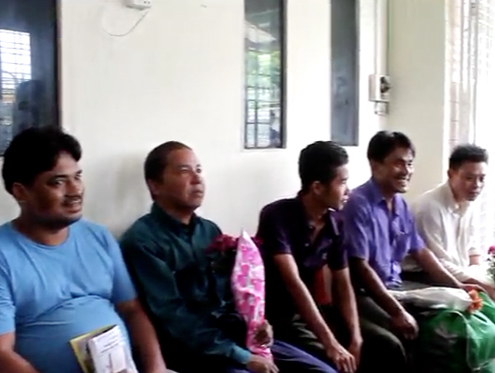More than 40 prisoners were released from prison today in Burma today during an anticipated amnesty granted by the government.
Thirty seven men and nine women were freed with a “a view to ensuring the stability of the State and making eternal peace, national reconciliation, enabling all to participate in [the] political process”, reported New Light of Myanmar.
“I’m neither grateful nor happy for being released,” said Than Zaw, who was freed after being locked up in July 1989. “I was imprisoned for so many years – more than two decades – for a crime I didn’t commit.”
The NLD youth member was arrested for his alleged role in the bombing of Thanlyin Oil Refinery on 7 July 1989. Than Zaw was originally given the death penalty, but the sentence was later commuted to life imprisonment.
The mastermind behind the bombing was a major in the Karen National Union Ko Ko Naing, who later confessed to the crime and was released in 2005. However, Than Zaw remained incarcerated after the actual bomber was freed.
“I wasted my youth inside the prison so there’s nothing to be grateful or happy about,” said Than Zaw during a phone interview with DVB. “I was imprisoned because of the SLORC/SPDC’s NLD-phobia.”
According to the individuals who were freed today, prisoners of conscience are still behind bars.
“There are more than ten [political prisoners] still in my prison ward,” said Saw William who was released from Insein Prison after being incarcerated for five years. “We shared the same ward together. I feel bad for them because they weren’t released.”
Saw William was sentenced for his alleged connection to a bombing in Pegu in September 2010.
According to the Asian Human Rights Commission, Burmese authorities alleged that the migrant worker illegally crossed the border into Thailand to train in ‘political defiance’ and raised money online to finance the bombing.
The newly freed prisoner said he was informed yesterday that he had been granted amnesty.
Student leader Aye Aung, who has been jailed in Kale Prison since 1998, was among the more high profile prisoners of conscience pardoned on Tuesday.
“I think freedom can only be achieved when there is safety,” Aye Aung told DVB by phone. “If there is rule of law and if the law can really protect [an individual] with safety, then we can have real freedom.”
Aye Aung was a member of the Dagon University Student’s Union, which organised demonstrations in the mid to late 1990s in Rangoon.
According to the Assistance Association for Political Prisoners (Burma), Aye Aung “organised students and led leaflet distributing activities concerning the reopening of the universities. In 1998, Aye Aung along with, student leader; Myo Min Zaw led the August and September 1998 student movements”.
The exact number of political prisoners that remain behind bars varies among the lists compiled by human right’s groups. The AAPP (Burma)’s most recent survey in June claims there were 465 verified incarcerated political dissidents in the country.
During a National League for Democracy press conference in Rangoon on Tuesday, Aung San Suu Kyi called for the release of the country’s remaining prisoners of conscience.
“Regarding the political prisoners, we’ve made calls for the release all of them,” said the country’s opposition leader who noted that the NLD believes there are 336 prisoners dissidents still imprisoned.
According to the New Light article, 34 foreigner prisoners were also deported on Tuesday.
The last large-scale amnesty occurred on 13 January when 651 prisoners were released, including high-profile dissidents such as Min Ko Naing, Ko Ko Gyi and Ashin Gambira.
– Peter Aung and Naw Noreen contributing reporting.



